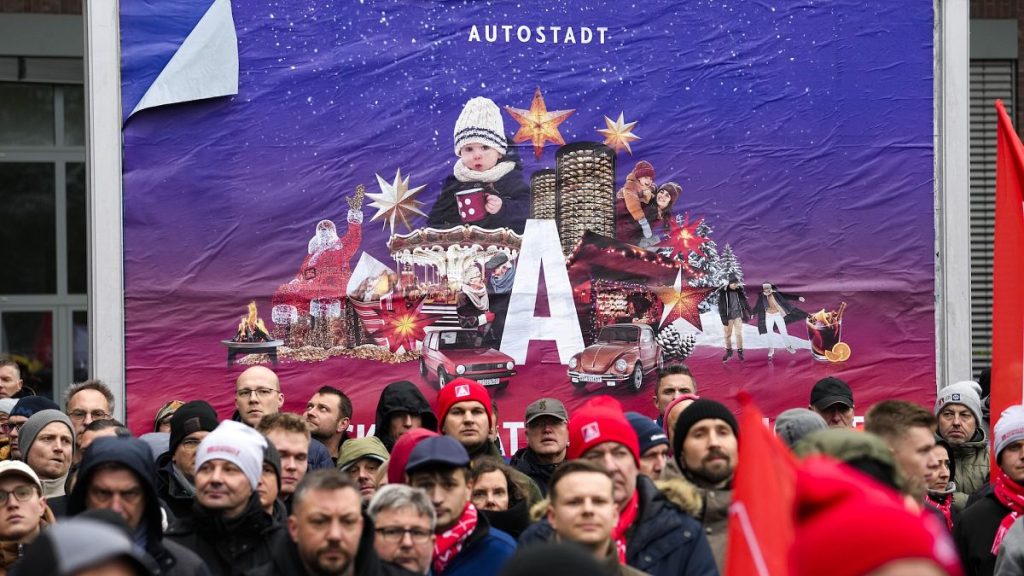Volkswagen AG, the German automotive giant, finds itself locked in a tense standoff with its labor unions, with the looming threat of plant closures and job cuts casting a long shadow over the negotiations. The core issue revolves around Volkswagen’s ambitious cost-cutting plan, a strategy deemed essential by management to navigate the turbulent waters of declining European demand, fierce Chinese competition, and the imperative to finance future investments, especially in electric vehicle technology. The company aims to slash a staggering €10 billion in expenses, a target that could translate into drastic measures such as shuttering factories in Germany, eliminating thousands of jobs, and imposing a 10% wage reduction for its employees.
The unions, however, view these proposed measures with deep skepticism, arguing that the burden of revitalizing the company should not fall solely on the shoulders of its workforce. IG Metall, the dominant metalworkers’ union, contends that alternative cost-saving avenues exist and has proposed strategies such as reduced working hours, lower dividend payouts, and bonus cuts, a package they estimate could save €1.5 billion. They vehemently oppose plant closures and layoffs, emphasizing the need for a solution that preserves jobs and safeguards the livelihoods of their members. The union leadership has stressed the shared responsibility of management and shareholders in contributing to the company’s financial recovery, arguing that employees should not bear the brunt of the cost-cutting measures.
The negotiations, which have now stretched through multiple rounds, remain deadlocked. While both parties acknowledge that the discussions have been “constructive,” they remain “far apart” on key issues. Volkswagen’s management insists on the necessity of short-term, impactful cost reductions to secure future investments, particularly in the face of mounting competition and evolving market dynamics. They maintain that reducing labor costs, a significant component of their overall expenses, is crucial for maintaining competitiveness in the global automotive market. The company’s chief negotiator has explicitly stated that plant closures are still a possibility, a prospect that further fuels the anxiety among the workforce.
The unions have responded to the stalemate with escalating demonstrations of labor power. Thousands of workers across nine Volkswagen plants in Germany have participated in warning strikes, temporarily halting production to underscore their dissatisfaction with the proposed cuts. A massive demonstration outside the company’s Wolfsburg headquarters saw tens of thousands of employees voicing their opposition to plant closures, layoffs, and wage reductions. These demonstrations serve as a stark reminder of the unions’ strength and their resolve to protect their members’ interests. Their message is clear: they will not passively accept measures they deem unfair and detrimental to the workforce.
The escalating tensions have drawn the attention of German Chancellor Olaf Scholz, who has urged Volkswagen to reconsider plant closures, adding a political dimension to the already complex negotiations. While acknowledging the autonomy of the company and its employee representatives, Scholz’s intervention highlights the broader societal and economic implications of Volkswagen’s decisions. The potential loss of thousands of jobs would have a significant impact on local communities and the German economy as a whole. His call for restraint underscores the delicate balancing act between corporate restructuring and social responsibility.
Looking ahead, the future remains uncertain. Further negotiations are scheduled, but the deep divisions between the two sides suggest a difficult path to resolution. The unions have threatened to intensify strike action in the new year if an acceptable agreement is not reached before Christmas, raising the specter of prolonged disruptions to production and further financial losses for Volkswagen. The company, in turn, remains steadfast in its pursuit of cost reductions, emphasizing the need for immediate action to secure its long-term viability. The coming weeks will be crucial in determining whether a compromise can be found that addresses the concerns of both management and labor, or whether the conflict will escalate further, with potentially damaging consequences for all involved. The stakes are high, not only for Volkswagen and its employees but also for the German economy, which relies heavily on the automotive industry and its workforce.














